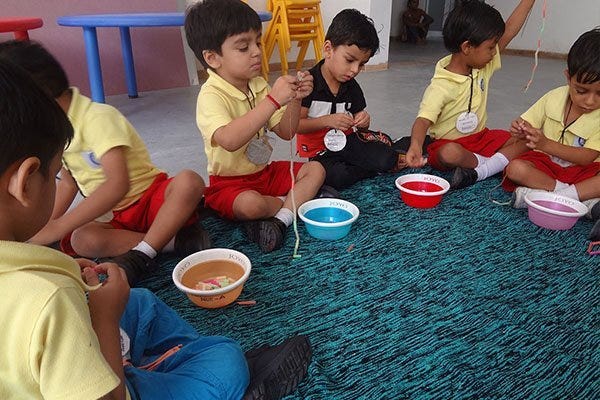The Role of Play-Based Learning in Pre-Primary Education: Benefits and Best Practices
The process of learning devoid of fun and play is dull and boring, sucking out the joy from learning and making it a monotonous chore. Play, when looked at cursorily, means simply playing and having fun, when in fact it has a deep significance and importance in life, especially for children. As per the visionary psychologist D.W. Winnicott, “Play is significant for cognitive development and learning for a child”.
The importance of play in children’s education has been further underlined by Hamphill: “Play is a spontaneous and voluntary activity; it enriches the child’s imagination, and as a result, they are able to explore many possibilities and strengthen their creativity”. Teachers around the world and at the Nursery school in Ahmedabad find it easier to teach when children collaborate in their learning process, and play-based learning is what earns their attention and collaboration.
Let us take a look at the benefits and some of the best practices of play-based learning.
- Collaboration with cooperation: Interest is the primary ingredient that invites interested parties to collaborate towards a mutual goal. And playing is something all children are very interested in and participate in with enthusiasm. Enthusiasm is essential for children to take an interest in learning, and this is possible only when the lessons are fun and joyful. Teaching through carefully designed playful activities keeps the children engaged and eager to become an active part of the learning activity.
- Cognitive development: Children learn a lot from their environment while participating in play-based learning. The engagement creates opportunities for them to explore the world around them, which helps them develop cognitive skills like problem solving, critical thinking, and creativity while playing.

- Developing language: One of the most significant benefits of play-based learning is the development of language and literacy. The best nursery schools in Ahmedabad design activities through which the children learn new words and their applications while practicing their language skills. They also develop their communication and social skills while building connections between oral and written words. Storytelling sessions with enactment are a great way of involving them and thus benefiting from this collaborative activity.
- Social mores: Play-based learning activities are conducted in groups, which is a fertile ground for the children to learn social mores like sharing, being kind, how to take turns, cooperate, help others, and listen to and following their teacher’s instructions. Thereby, they are laying the foundation and valuing teamwork and problem solving as a team, which will help them when they begin their formal education. Games like ring-a-ring-a-roses” are a good way to teach language, rhythm, and social mores in a playful way.
- Emotional and physical development: Experiences are connected with emotions, and play-based learning provides ample opportunity for new experiences that evoke varied emotions for the children to discover and explore. Learning what makes them happy, sad, or upsets them and how to manage and express them. Enacting little plays and scenes by allotting roles to the children is one good way to promote emotional development. The enactment hones their physical abilities by teaching them how to balance, hold, and place things, understand space and area, and more. Physical play is equally important for their development, so games like hopscotch, catch the ball, etc. will further the honing of physical skills. Nursery school in Ahmedabad has an allotted time to engage children in games and outdoor activities.

- Creativity and imagination: Children have a natural affinity for art, creativity, and imagination due to their sense of wonder. Watch a group of children playing together, and you will be surprised to see the ingenuity and creativity they display to do the activity well or win the game. Playing with shapes and colours not only gives them the freedom to give wings to their imagination to explore and express their creativity through various arts and crafts mediums, but also teaches them to identify different colours, shapes, and pictures. Add to this the joy and thrill they derive from creating something with their own hands.
- Enthusiasm: As mentioned above, for children to develop an interest in learning, they need to be engaged in learning that is fun. Play-based learning builds a positive attitude toward learning, which is important to establish for them to look forward to learning by making studies a pleasant experience instead of a tedious or fearful one they balk at undertaking.
In today’s world, it is best to start your child’s educational journey at a good school as soon as possible. Find the right fit for your child by searching for the best nursery school near me, and let the learning begin.
.jpg)
Comments
Post a Comment